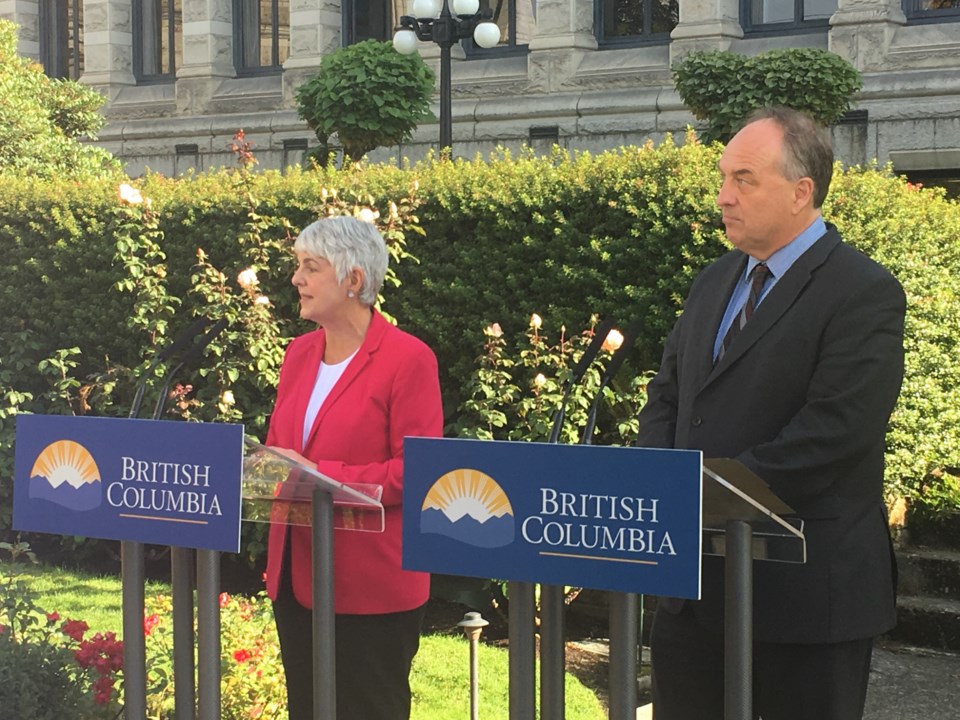Andrew Weaver is BC politics’ kingmaker, with a government secretariat dedicated to ensuring “good faith and no surprises” between his Green Party caucus and the minority NDP government.
And yet, he found out the details of the speculation tax in the newspaper – some of which he had just assured his constituents wouldn’t happen.
“We were told by the finance minister and Premier that it wouldn’t affect British Columbians. [Then] I was sent a Vaughn Palmer article, and read that I was sending out incorrect information,” said Weaver.
“It’s kind of personal to us when we’re sending out bad information. Not because we wanted to do it, but because we were told.”
Despite holding what amounts to a veto – assuming the opposition BC Liberals also vote against the government – Weaver’s Greens have swallowed a steady stream of compromises, including Site C, LNG, and the speculation tax.
Weaver says those days are over.
“Times have changed. That wouldn’t happen now,” said Weaver.
“After the election, this was a difficult time. We didn’t know what it was to be in a minority government, [the NDP] didn’t know what it meant to govern, and were governing as if they had a majority.”
“I like John [Horgan]. I think it was some people who were advising him that he probably shouldn’t be listening to as much,” said Weaver.
“And so we’ve had a lot of discussions – LNG and Site C, you wouldn’t see that play out that way now.”
Weaver points to a number of items he got the NDP to alter, including moving up GHG emissions target legislation to the spring session, and softening the speculation tax to focus solely on urban areas.
“I brought a multitude of issues directly to the NDP. They said they were trying to go after speculation in urban areas – so why do you have Cultus Lake in there?”
“It was bad public policy. We able to get it to a position to make three further amendments. [Finance Minister] Carole [James] didn’t want to do them; it was tough but very positive,” adds Weaver.
2019 will bring more issues that may test the NDP-Green alliance, including LNG. Weaver and his caucus are still quite negative about LNG Canada, and appear to have drawn a line in the sand on more projects. Asked if there was room for Woodfibre LNG in Squamish and/or Kwispaa LNG in Port Alberni, Weaver is clear:
“No. The answer is no.”
That said, Weaver allows that Woodfibre has already gone through the environmental assessment process – and “I’m not so worried – it’s tiny.” Since then, the assessment process has become more rigorous.
“I feel very comfortable about that – you can’t just add emissions,” says Weaver, “Gotta be blunt: [Kwispaa LNG] just doesn’t make any sense, fiscally.”
Weaver vigorously disputes that First Nations and Indigenous support for either or both projects should make any difference for public – or crucially, NDP government – support.
“That’s not on. UNDRIP does not mean you do whatever the hell you want. UNDRIP means that government does not do whatever the hell it wants. It’s a two-way street.”
“If you’re creating emissions, it’s affecting my ability to do business, because now I gotta reduce more emissions,” adds Weaver.
Another potential storm cloud ahead – an issue where Weaver has publicly disagreed with stated NDP policy – is in labour relations.
Premier John Horgan and Labour Minister Harry Bains have both been clear: they want to do away with secret ballots for union certification, and move to a card check system, where everyone knows whether and how everyone else has voted.
Weaver says he still “believes fundamentally in secret ballot,” but…there’s a crack:
“The one thing that I’m a little more open to discussing is I recognize building trades are different from, say, office trades.”
“When you have people working at fixed location, there is no excuse not to have a secret ballot. If you’re crane operators on a building site, and move onto another building site in six weeks, there might be some discussions we could have.”
Weaver also pointed to the hybrid model in Ontario, where building trades have a form of card check.
In other words, his commitment to a secret ballot is at least somewhat negotiable.
We closed our interview with two issues the Greens and NDP have been in lockstep: the Speaker’s Office scandal, and Proportional Representation.
On the still-unfolding events in the legislature and Speaker’s Office, Weaver pleads for patience.
“I have a lot of questions that I’m going to be asking, but I don’t think now’s the time to be asking,” says Weaver.
“We don’t have the details. This was a bit of a bombshell. There was a void of information, and that void ends up getting filled by all sorts of things, conspiracy theories. I’ve heard everything.”
“It is what it is. Love for it to be done before Christmas,” says Weaver, admitting he has no idea if that’s reasonable.
On PR, Weaver predicts a Yes win (naturally), on a 52-48 margin – and says B.C. had a good public debate, despite some hyperbole on both sides – which may have kept turnout down.
“Then they would tune out. The No campaign’s early meme had like goose-stepping Nazis in the street – no. And on the other hand, you’ve got ‘it’s good for salmon’ – no.”
“I didn’t run for politics because of PR. If this passes, awesome. But I haven’t lost any sleep.”
Maclean Kay is Editor in Chief of The Orca



